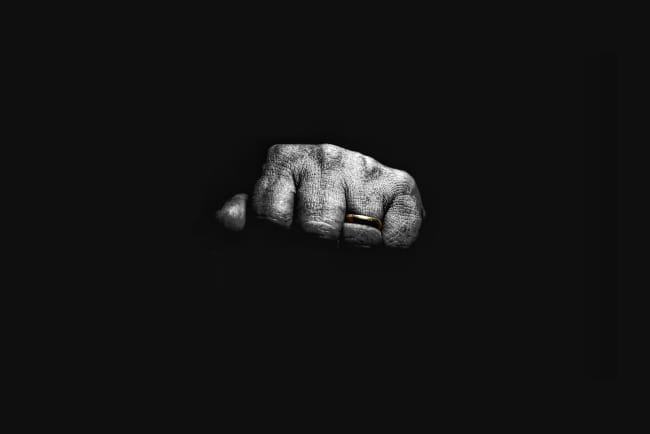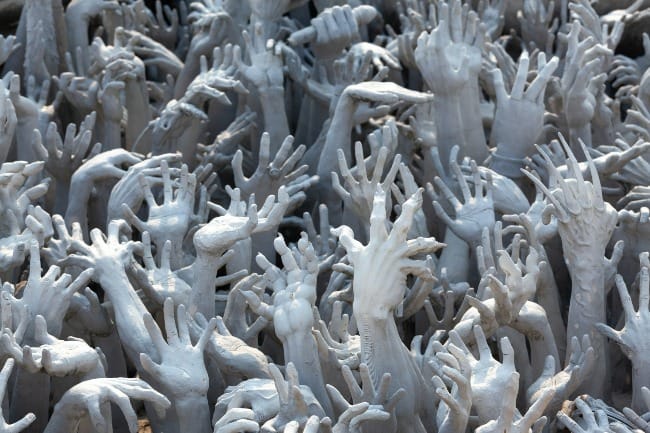If you want to take a moment and read the first chapter of Exodus, click HERE.
The first thing the writer of Exodus wants us to know is that the story we are about to read picks up where the book of Genesis ends. As a quick recap, God's plan for the earth to flourish has been thwarted by the human creatures called to develop and care for the world. God initiates a plan to set things right by choosing a couple - Abraham and Sarah - to bless and help renew the world. By the end of Genesis, their descendents are in Egypt, living well due to the influence and power of their great-grandson Joseph, who has miraculously risen to a place of significant power in Pharoah's regime.
Eventually, however, "Joseph and all his brothers and all that generation died." Though the original family is gone, the people continue to prosper. In fact, the writer of Exodus intentionally pulls us back to Genesis 1 to help us see a direct connection to the creation story. "The Israelites were exceedingly fruitful; they multiplied greatly, increased in number and beame so numerous that the land was filled with them." This is an intentional reference to Genesis 1:28: "God blessed them and said to them, "Be fruitful and increase in number; fill the earth and subdue it." We see from the beginning that what happens in Exodus is directly connected to God's purposes for creation, particularly as it relates to humanity's place and role. God's blessing and calling continue, despite the twists and turns of human history.
But notice what is missing from the Exodus text - there is no mention of the Genesis call to "subdue" the earth or "rule over" the other living creatures of the world. This is left out, I think, for two reasons. First, it is a reminder that the Israelites are in no position to rule over anything - despite their favored status, they live under Pharoah's protection and good favor, which, we will see, is a very precarious place to live. Second, and more importantly, the drama of Exodus is about two very different visions of human life on the earth: the way of Pharaoh, which seeks to rule over people and creation from a position of dominance, fear, and control, and the way of the Creator, which roots people in sacred relationship with God, one another, and creation based in mutuality and care.
This conflict begins to emerge with a change in Egyptian leadership - "a new king arose over Egypt who did not know Joseph."

A World of Oppression
The new king sees his land filling with "hibiru" (a term in the Ancient Near East that referred to low-class, disposable, working people, from which we get the word "Hebrew"), and he sees a threat. We immediately see that this king sees the world in terms of scarcity, competition, and raw power. Filled with anxiety and fear, he warns "his people" that Egypt's foreign labor population could grow big enough turn against the regime.
Pharaoh's solution is not subtle - "they put slave masters over them to oppress them with forced labor, and they built Pithom and Ramses as store cities for Pharaoh." Pharaoh opts for totalitarian control over the Israelites, and then uses them to consolidate control over food production and storage. He is exerting power over people and creation, bending them to his will. This is far from the Genesis vision for creation, in which a generous God creates an expanding abundance of food for all creatures to discover and enjoy.
Despite Pharaoh's aggressive tactics, the blessing continues - "the more they were oppressed, the more they multiplied and spread." God finds a way. Unfortunately, this only makes their situation worse. We discover that it's not just Pharaoh who is filled with fear - "the Egyptians came to dread the Israelites and worked them ruthlessly." The Israelites find themselves in the grip of a whole culture of oppression that works them - and the land - to the bone.
Though their suffering is great, Pharaoh adds to it by attacking the fertility at the heart of the people's growth. He recruits two Hebrew midwives to kill every newborn baby boy. It is a horrific command, and yet it reveals the limits of Pharaoh's totalitarian power. The midwives - Shiphrah and Puah (they are named while Pharaoh is not) - do not obey. Playing to Pharaoh's fear of the people's strength, they tell him that the Hebrew women are so strong and vigorous that they give birth before the midwives even arrive. And once again we are told that "the people increased and became even more numerous."
Pharaoh is fooled, but not finished. At the close of Chapter 1, he extends the order to all his people - they must throw every Hebrew baby boy into the Nile. We will see in Chapter 2 the way that, once again, this desperate and terrible decision gets turned on its head in a way that plants the seeds of Pharaoh's undoing - God's blessing continues to find a way.

The Perpetual Struggle
You can probably see already how the particularities of Exodus highlight the universal struggle between oppressors and oppressed, domination and cooperation, scarcity and abundance. You can also probably see how this struggle affects not only how humans relate to each other, but also how they relate to the earth. Here are a few connections to our time that I see.
I see connections to contemporary attitudes towards foreigners and immigrants. In America, for instance, significant portions of the economy depend on immigrant labor, but there is a persistent fear, often sparked and stoked by people in power, that this labor force presents an existential threat to the existing social and political orders. Such threats must be suppressed, either by walls that keep people out, or through policies that enable those in power to maintain tight control over the populace.
I see connections between Pharaoh's need to sustain Egypt's economic dominance by pushing the labor force and the land to their limits, and our modern, industrial system that exploits workers and drains ecosystems. Pharaoh's use of propaganda to compel his people to support his oppressive policies - "they may rise up against us" - makes me think of the way oil and gas companies have known for decades that their products are driving climate change and yet continue to protect their profits through disinformation and greenwashing. This quote from an article about British Petroleum's efforts is representative:
Twenty years ago, under John Browne, the CEO who turned BP into a global energy competitor, the company launched a US$200-million public relations campaign to rebrand itself as Beyond Petroleum, complete with a starburst green and yellow logo that carried no hint of the core business. The implication was that BP, in time, would become a diversified energy company, with oil just one of its divisions. The transformation went nowhere. BP realized it was better at drilling holes than operating wind and solar farms and got rid of them shortly after Beyond Petroleum was rolled out. It doubled down on its oil bet by investing heavily in U.S. shale oil and gas and the Alberta oil sands. BP’s Deepwater Horizon oil spill in 2010 in the Gulf of Mexico, one of the industry’s worst disasters, reminded the world that BP’s heart was black, not green.
I see connections between the brave Hebrew midwives and those without much power today who stand up to oppressive people and systems. From well-known names like Greta Thunberg to thousands of unknown activists around the globe, there are pockets of resistance that, in many cases, play a key role in turning the tide toward liberation. Whether these efforts are focused more narrowly on human struggles or include more explicitly the non-human world, they are all rooted in God's intentions for a blessed and flourishing creation.
I see connections between the struggle at the heart of the story - Pharaoh's way or God's way - and the struggle in my own heart. It is tempting to only see myself in the role of the Hebrews, struggling against injustice for the good of creation - I'm one of the good guys! The truth is more complicated - having been born in one imperial country (England) and raised in another (America), I am part of (and have benefited from) cultures much like Pharaoh's. As I read the story, I must be open to the ways I contibute to the suffering of people and places. Holding that tension, at least for me, allows me to hear both the promise and the critique of the text.
What Connections Do You See?
I have only scratched the surface of this chapter and how it might help us see connections between the biblical text and the world of today. If you see other connections, or simply want to comment on what I've written, please leave a comment below, or email me directly at james.amadon@circlewood.online. Let's learn and grow together.
With you on the Way,
James
Like what you are reading? Consider joining our supporter community, The Circlewood Stand.